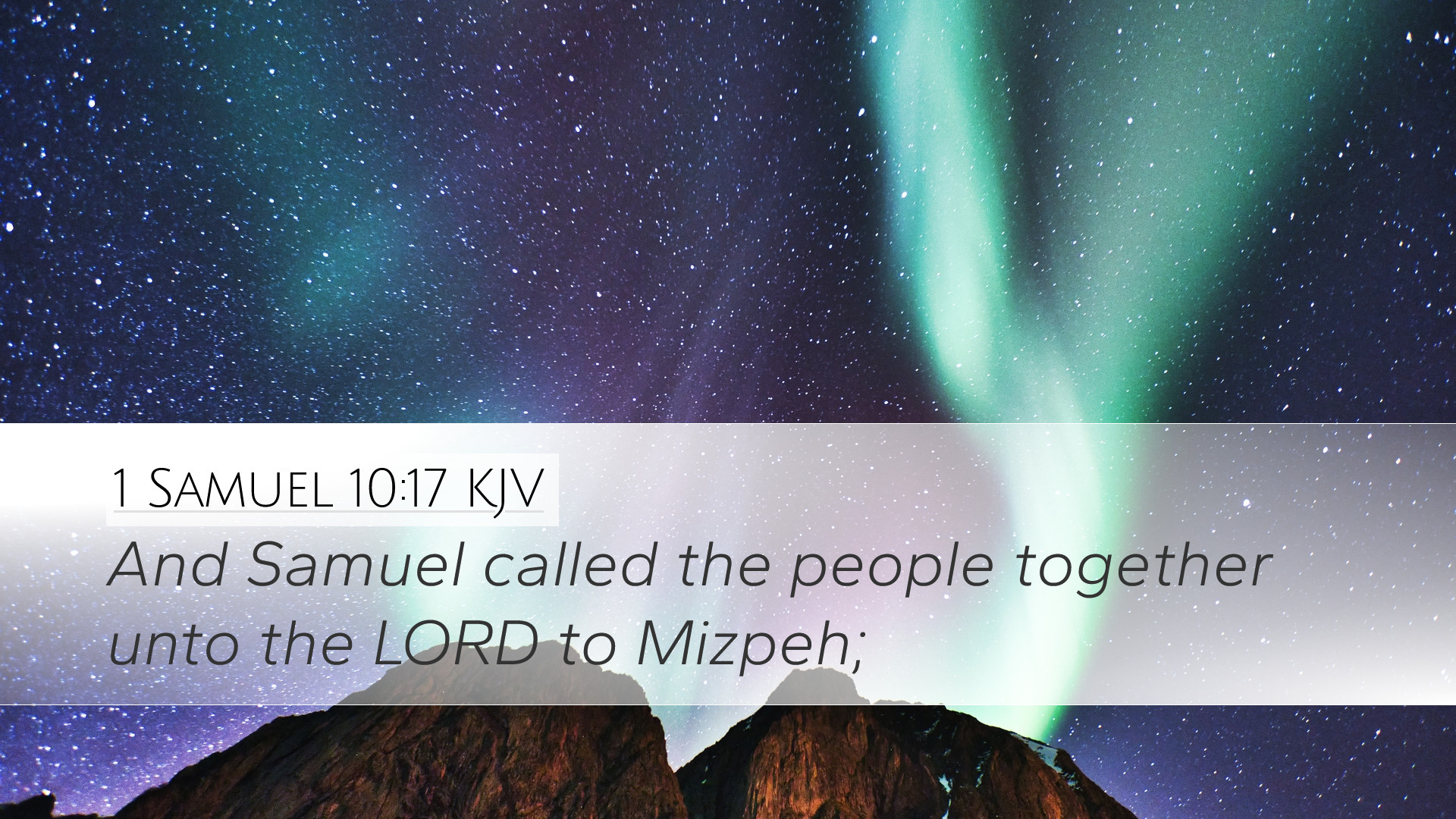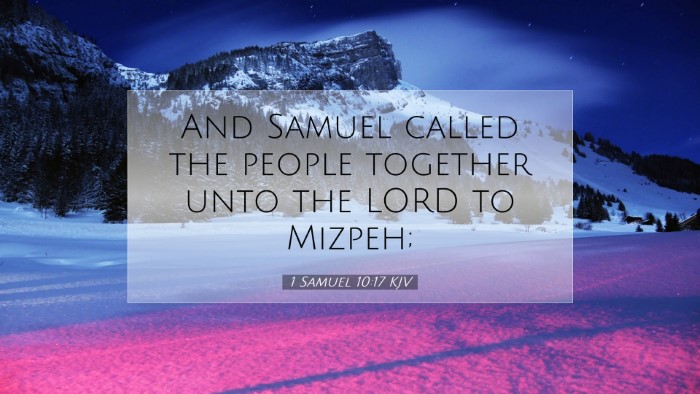Commentary on 1 Samuel 10:17
Bible Verse: 1 Samuel 10:17 - "And Samuel called the people together unto the LORD to Mizpeh."
This verse marks a pivotal moment in the history of Israel as God prepares to establish a monarchy, transitioning from the previous system of judges. The assembly at Mizpeh is not only significant in terms of political transition but also serves as a spiritual gathering, highlighting the importance of collective worship and divine guidance in leadership.
Context and Setting
The backdrop of this event is crucial for our understanding. Israel, in its cyclical pattern of sin and repentance, finds itself crying out to God for a king. As Samuel the prophet, who had been a judge over Israel, approaches the end of his leadership, the people express their desire for a king like the nations around them (1 Samuel 8:5). This request signifies a departure from reliance on divine guidance to human governance.
Theological Implications
This passage highlights several key theological principles:
- Divine Sovereignty: Despite Israel's insistence on a king, God's sovereignty remains at the forefront. Samuel's role is not merely as a facilitator but as God’s chosen representative, emphasizing that any leadership must be sanctioned by the Lord.
- Human Rebellion: This moment reflects humanity's ongoing struggle with trust. Instead of relying on God’s provision and leadership, the Israelites sought a tangible king, showcasing a lack of faith and understanding of God’s plans.
- Collective Worship: The gathering at Mizpeh underscores the importance of communal worship and collective seeking of God’s will. It reflects an understanding that significant decisions should be bathed in prayer and communal input.
Insights from Public Domain Commentaries
Matthew Henry's Commentary:
Matthew Henry emphasizes the importance of prayer and solemnity in seeking God’s guidance. He notes that Samuel, despite being the leader, recognizes the necessity of gathering the people to consult with the Lord. Henry states that this assembly serves to position Israel’s new king under God's authority and to remind the people of their covenantal relationship with Yahweh.
Albert Barnes' Notes on the Bible:
Albert Barnes remarks that the choice of Mizpeh as the location for this gathering is significant. Mizpeh had been a place of previous assemblies and was seen as a location of divine encounter (Judges 20:1). He notes that Samuel’s calling of the people to Mizpeh is reflective of a desire for transparency and public acknowledgment of the authority of God in this new political structure. Barnes also indicates that in this assembly, Samuel seeks to renew Israel’s commitment to the Lord before proceeding to anoint a king.
Adam Clarke's Commentary:
Adam Clarke brings attention to the broader narrative of Israel’s history at this juncture. He notes that the people’s cry for a king stemmed from a desire for security and stability in an increasingly tumultuous environment. Clarke underscores Samuel’s role as a mediator who facilitates this transition while ensuring that the sovereignty of God is acknowledged. Furthermore, Clarke elaborates on the ramifications of this moment, predicting that the people's choice would lead to long-term consequences that would affect their relationship with God.
Practical Applications
For modern-day pastors, students, and theologians, this passage offers several areas for reflection:
- Leadership and Accountability: Church leaders are reminded of the need for humility and accountability to God. Samuel serves as a model of a leader who seeks God’s will above personal desire or societal trends.
- Importance of Community: The communal aspect of decision-making reflects the biblical principle that believers should seek counsel among one another and pray collectively for guidance in uncertain times.
- Responding to Cultural Pressures: Just as Israel was influenced by surrounding nations, contemporary believers must also navigate cultural pressures while remaining faithful to God's commands and purposes.
- Covenantal Relationship: The events at Mizpeh remind the faithful of their covenantal relationship with God, encouraging constant remembrance of His sovereignty in all aspects of life.
Conclusion
The assembly at Mizpeh, as recorded in 1 Samuel 10:17, encapsulates a significant moment in Israel's history marked by the transition to monarchy. It serves as a profound reminder of both human frailty and divine sovereignty. In this time of seeking a king, Israel’s leaders, and subsequent generations are called to remember their dependence on God and to approach all decisions with collective humility and prayer. This passage continues to resonate today, challenging believers to prioritize God’s authority and plan in their lives and communities.


